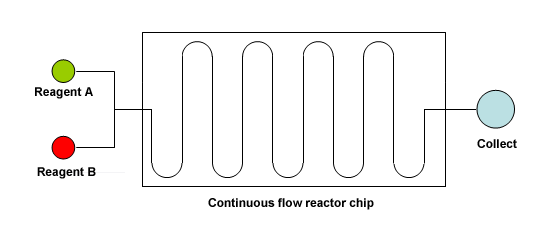
Flow chemistry is at times referred to as the plug flow, continuous flow chemistry or microchemistry which is the method of performing chemical reactions in the pipe or tube. Reactive components are being pumped together at the mixing area and flowed down in a pipe or tube with controlled temperature.
A great thing with flow chemistry is that this comes with faster reaction. Also, there are cleaner products, easy scale-up, quick reaction and safer reactions and the integration of the typically separate processes like work-up, analysis and synthesis.
Faster reaction is considered to be a benefit of flow chemistry. It is easy to pressure flow reactors. This enables reactions to be heated from 100 to 150 C which is above the normal boiling point and because of this, the reaction rates can be 1000 times faster. Superheating is the name given for this process.
Another advantage is cleaner products. Flow reactors by steven ley permit reaction selectivity. The rapid diffusion prevents the issues which are found in batch reactors. High surface area to the volume ratio permits instantaneous heating or cooling and due to this, there is excellent temperature control.
Another excellent advantage is safer reaction. Flow chemistry just allows a small amount of dangerous intermediate to be made at any instant. This means a great control of exotherms in high surface area.
The reaction products which exit the photochemistry flow reactor which is then flowed through the flow aqueous workup system. They can be analyzed through sample or in line. Through the use of the sampler and the dilutor and injected onto and the LCMS.
The rapid reaction optimization is another advantage of flow chemistry. The flow chemistry with automation permits quick variation of reaction conditions on the small scale. Parameters such as ratio of reagents, reaction time, temperature, concentration and reagents can be quickly varied. A reaction may follow another, which is separated by the solvent.
The easy scale-up is also a great benefit. The scale up issues are reduced because of maintaining excellent mixing as well as heat transfer. The higher flow rates as well as larger reactors can be utilized to produce kilogram quantities in an easy way.
Also, the flow chemistry can facilitate reaction conditions which are not possible in batch like the 5 second reaction at 250 C. Addition of electrophile high temperature as well as the rapid low temperature deprotonation and other multi step procedures may be done easily.
Continuous processing and flow chemistry can provide so many ways so that synthesis becomes a more sustainable practice. Such technologies help bridge the large gap between industrial setting and academic settings through providing a more scalable, reproducible, safe as well as efficient option for conducting chemical reactions. Read some related information at http://www.huffingtonpost.com/thai-nguyen/hacking-into-your-happy-c_b_6007660.html.